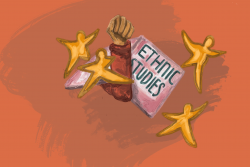As Álvaro Uribe approaches the end of his yearlong appointment as a Distinguished Scholar in the School of Foreign Service, his tenure offers some clear lessons for the administration on how to handle high-profile and controversial guest scholars. When Uribe arrived, there were reasonable concerns about his record on human rights, but the University promised that the ex-Colombian president would provide students with a “unique perspective” and be a catalyst for fruitful debate. Instead, the administration has sheltered Uribe, preventing the type of open and honest interaction with students that could have justified his appointment.
Uribe’s appearances on campus have not been publicized to the general student body. With the exception of a few guest lectures last fall, the ex-leader has instead spent most of his time on campus meeting with groups of handpicked students. Uribe’s appearances are veiled in extreme secrecy—those who receive invitations to meetings or events are often told not to share any details of his presence. Many faculty members are unaware of when he is even on campus. It’s unfortunate, but for most Georgetown students, the only reminder that the University is hosting a former president are the occasional protests of the Adios Uribe! coalition in Red Square.
Uribe is not the first scholar of his kind at Georgetown. The hiring of Iraq War architect Douglas Feith brought similar controversy, as did that of former Spanish President Jose Maria Aznar in 2006 and former Secretary of Defense Henry Kissinger before him. There is legitimate reason to debate whether these polarizing political figures truly exemplify Georgetown’s Jesuit values. But if the University is intent on hiring visiting faculty with prestigious names, then it should take the necessary steps to ensure that the Georgetown community can actually benefit from their presence. Such professors and scholars should be encouraged to make themselves available to as much of the student body as possible, even those students who may disagree with their politics or positions. If interaction is limited to select students and formats, then these kinds of appointments serve no purpose. They generate controversy without productive debate and do almost nothing to broaden students’ understanding of the world around them.
Despite his controversial record, Uribe could have imparted a great deal of wisdom upon Georgetown students. Instead, he managed to leave behind just one valuable lesson: a visiting scholar might have some valuable experiences, but if he chooses to isolate himself from meaningful debate and discussion, he’s not worth the trouble.




